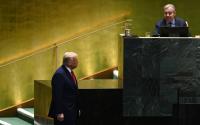19 June 2007Rory McCarthy in Ramallah and Simon Tisdall
 A Palestinian boy collects fuel from a depot selling cooking gas in Gaza City. Photograph: Said Khatib/AFP/Getty
A Palestinian boy collects fuel from a depot selling cooking gas in Gaza City. Photograph: Said Khatib/AFP/Getty
Condoleezza Rice, the US secretary of state, said she had offered full US support to Palestinian President Mahmoud Abbas and the newly appointed government, whose prime minister, Salam Fayyad, is an economist favoured by the west, in a phone call earlier in the day. "I told [Fayyad] the US would resume full assistance to the Palestinian government," she said.
Ms Rice said the US believed there was one Palestinian people with one leadership and that was headed by Mr Abbas. But she pledged not to turn her back on Gaza. "We are not going to leave 1.5 million Palestinians at the mercy of a terrorist organisation... We are not going to abandon the Palestinians who are living in Gaza.
Ms Rice said the $40m would be distributed via the UN Relief and Works Agency.
President Bush, who spoke to Mr Abbas yesterday, is expected to discuss the Palestinian leader's plea for resumed peace talks when he meets Israeli prime minister, Ehud Olmert, at the White House today.
Israel yesterday ordered a halt to all cargo shipments bound for Gaza, which is now under full Hamas control. All crossings into Gaza remain closed. But an Israeli firm that sells fuel to Gaza said it would lift restrictions on sales.
As both Israel and the west sought to clearly differentiate their policies towards the two Palestinian territories, the Israeli foreign minister, Tzipi Livni, argued for further isolation of Hamas.
"We should take advantage of this split to the end," said Ms Livni, who was in Luxembourg. "It differentiates between the moderates and the extremists."
She said Palestinian tax transfers, worth more than £250m but frozen by Israel, would be released if the new government accepted Israel's right to exist.
EU officials said they were still assessing when to restart funding to the Palestinian government. All direct funding was halted in March last year, after Hamas won elections and formed a government. "There will be part of the money that will be direct," said Javier Solana, the EU foreign policy chief. It was not clear if any of this money would be channelled by the Palestinian government to Gaza.
In the West Bank, the new emergency cabinet, made up largely of independent politicians close to Fatah, met for the first time yesterday in Ramallah. The government said it would exert authority over all the territories, although in reality the new cabinet has almost no control over Gaza.
"The government will pursue its jurisdiction over all parts of the homeland, regardless of what happened in Gaza," said Riyad al-Malki, the new information minister. He admitted that the cabinet had no clear idea how to prevent any spillover of factional clashes into the West Bank. "We still do not have a clear plan," Mr Malki said.
Fatah is stronger in the West Bank, but Hamas still commands support in many areas, particularly Nablus, where several Hamas offices have been looted by Fatah gunmen in recent days. Abdel-Razzak Yahya, the new interior minister, was asked how he would enforce law in Gaza. "I swear to God I do not know," he said.
Mr Abbas won a vote of support from within his movement yesterday when Marwan Barghouti, a jailed Fatah commander, said he backed the president. But, in a statement released from his Israeli prison cell, Mr Barghouti also called for major reforms within Fatah, including the sacking of senior commanders who had responsibility for Gaza.
Mr Barghouti leads a young guard within Fatah and commands more respect among Palestinians than Mr Abbas. Since Fatah lost the elections last year, many in the party have called for a new leadership but there is still disagreement, even following the Hamas takeover in Gaza.
Qadura Fares, a former MP and a Fatah official close to Mr Barghouti, called for the ousting of Mohammad Dahlan, a powerful Fatah leader from Gaza who is a key opponent of Hamas. "Mr Abbas has made good decisions but he has to continue making them in the coming days," said Mr Fares. "In the security services he has to make changes." However, yesterday Mr Abbas re-appointed Mr Dahlan to a newly formed National Security Council.
http://www.guardian.co.uk/international/story/0,,2106137,00.html






